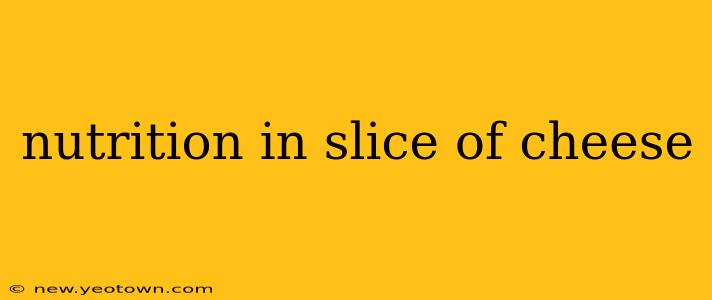Cheese. That creamy, melty, sometimes sharp, sometimes mild delight. It's a staple in countless cuisines, a snacking superstar, and a culinary chameleon, transforming dishes from simple to sublime. But beyond its deliciousness lies a surprisingly robust nutritional profile. Let's delve into the world of cheese nutrition, specifically focusing on what's packed into that seemingly simple slice.
This isn't just about calories; we'll explore the vitamins, minerals, and potential health benefits (and drawbacks) of enjoying a slice of this dairy delight. Our journey will answer some frequently asked questions along the way, ensuring you gain a complete picture of cheese nutrition.
What are the nutritional benefits of eating cheese?
A slice of cheese, depending on the type, offers a concentrated source of several essential nutrients. We're not just talking about calcium; many cheeses are rich in protein, providing those crucial building blocks for muscles and tissues. They also boast a variety of vitamins, particularly vitamin A (often in the form of retinol), vitamin B12 (essential for nerve function), and vitamin K2 (important for bone health and blood clotting). Furthermore, cheese contributes various minerals, including phosphorus, zinc, and riboflavin, all vital for overall health and well-being.
Think of it as a mini nutritional powerhouse, tucked neatly into that convenient slice.
How many calories are in a slice of cheese?
This is where things get a little less straightforward. The calorie count in a slice of cheese varies wildly depending on the type of cheese, the size of the slice, and the manufacturer. A thin slice of part-skim mozzarella might contain around 50-70 calories, while a thicker slice of cheddar could easily reach 100 calories or more. Always check the nutrition label on the specific package you're consuming for the most accurate information.
Is cheese good for weight loss?
This is a question that often sparks debate. While cheese is undeniably nutritious, it's also relatively high in fat and calories. Incorporating cheese into a weight-loss diet requires mindful portion control. Opting for lower-fat varieties and limiting your intake can help you reap the nutritional benefits without derailing your weight-loss goals. Consider cheese as a part of a balanced diet, not the centerpiece.
What type of cheese is the healthiest?
There's no single "healthiest" cheese, as the nutritional profile varies greatly. However, some generally healthier options include part-skim mozzarella (lower in fat), feta (rich in protein and probiotics), and cottage cheese (high in protein and relatively low in fat). Remember to check the nutrition label to compare different brands and varieties, paying attention to fat content, sodium levels, and overall calorie count.
What are the potential downsides of eating too much cheese?
While moderate cheese consumption offers many benefits, excessive intake can present some challenges. High sodium content in many cheeses can contribute to high blood pressure if consumed in large quantities. The saturated fat content might also raise cholesterol levels in some individuals. And, of course, the calories can add up quickly, potentially hindering weight management efforts. Moderation is key, as with most things.
Does cheese contain protein?
Yes, cheese is an excellent source of protein. The amount varies between types, but a slice of cheese can contribute significantly to your daily protein intake. This protein is crucial for building and repairing tissues, supporting immune function, and maintaining overall health.
Conclusion: A Balanced Approach to Cheese Consumption
Cheese, in its many forms, offers a rich tapestry of nutrients. However, it's essential to enjoy it as part of a balanced diet, paying attention to portion sizes and choosing varieties that fit your individual health goals. Understanding the nutritional information on the label and considering your overall dietary needs will help you enjoy this delicious dairy product responsibly and reap its numerous benefits. Remember, a little cheese goes a long way – both in terms of flavor and nutrition!

